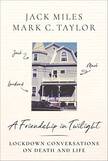Review: Two scholars on Covid, mortality and the meaning of friendship
It has to be said upfront that this is a very unlikely book. For one thing, it is a correspondence between two friends who are notable in their own fields while not being exactly household names. Jack Miles is probably the better-known to readers of America, mainly for his best-selling God: A Biography. Mark C. Taylor is a significant figure in philosophical and theological discourse, but not widely known beyond these academic specialties.
Their exchange, which took place over a mere nine months but stretches to well over 400 pages of text, has been edited down from an original 1,400 or so manuscript pages. And while it tells a familiar story about how we all reacted to the first months of the pandemic, the immediacy of the letter format is challenged by the fact that, two years later, a lot has changed; as a result, many of the comments both authors make understandably seem quite dated. What was it, then, that made the case for publication?
This is really a book about friendship, not about the pandemic.
Certainly, it is not unreasonable to expect from these two distinguished authors and thinkers a lively and challenging set of reflections on living through the early months of the pandemic. Here, I have to confess to a little disappointment. Of course, their thoughts are sensitive and accurate; filled with the foreboding that was rightly current in the months before there was any vaccine, when we were all more or less locked down and daily seeing frightening tallies of the hospitalized and the dead. Surprisingly, there are few or no comments on the pandemic itself at which this reader at least stopped to think, “Wow, that was an amazing insight!” But there were many where I thought, “Yes indeed, exactly what I was thinking.”
Which only goes to show, I suppose, that great intellects with good pens can still be fairly pedestrian about matters that are not their specialty. To their credit, or that of the publisher, the title of the book points the reader in a different direction: A Friendship in Twilight. The pandemic’s early stages were real enough, sufficiently sobering for there to be conversations on death and life, particularly when the writers were well into their 70s. And if the reference to “twilight” seems just a tad maudlin, if not impossibly romantic, the focus on friendship hits the editorial nail on the head. This is really a book about friendship, not about the pandemic.
The true beauty of the book, then, is that while the early months of the pandemic are the background and occasion for the letters, the friendship they display is vastly more interesting. And while there are moments when the pandemic and the writers’ own health issues and age seem to steer the book toward the frankly morbid, there is a great deal to relish and cherish too. Care for one another and their respective families, exchange of ideas and reading recommendations, philosophical gossip and teetering around the transcendental together: All of these and more testify to the warmth of the relationship and, frankly, to the luxury of time to write at such length, an unintended consequence of the lockdown.
Among my own favorites is Miles’s letter full of thoughts on Eastern religion, ending with Protagoras and pork chops.
As for us readers, dipping in here and there seems to be best. Four hundred pages is very long, but a five-page bite in which the two of them exchange opinions about Niall Williams’s wonderful book, This Is Happiness, or an exchange on their respective tolerance level for country music is just enough to gnaw on for one day. Among my own favorites is Miles’s letter full of thoughts on Eastern religion, ending with Protagoras and pork chops.
The writers’ growing recognition of the interrelationships between the pandemic and the efforts of American political leadership to deny and then obfuscate its impact becomes a secondary theme of the letter exchange. Bit by bit, the run-up to the presidential election begins to play a larger role in their reflections, picking up speed with the electoral defeat of Donald J. Trump and all that followed. There are, the authors think, two problems, different in setting but related in form. As they say in their introduction, “Our world is ablaze with a virus that is both biological and political.”
Having recognized this complicated situation, they seem to have seen the need to pay rather more attention to the political toward the end of the book. The final section, entitled “Epiphany,” caps reflections on the November 2020 elections with a page or two, both elegiac and hopeful, occasioned by the events of Jan. 6, 2021. Here once again they give voice to thoughts that are not unusual, but better expressed than most of us could do, and, most importantly, salted by 50 years of friendship.
Miles’s last words suggest the perils of the pandemic “will grow worse before they grow better.” He ends in hope, however, based “on the power of truth.” Taylor’s conclusions blend Johnny Cash and Samuel Beckett—surely a rare pairing. Like Beckett, Taylor thinks, he will “go on.” For his students and his children and grandchildren, for sure, but also for his friend.
We have written this together, Taylor writes: “I wager our conversation will continue to change us after one of us, perhaps both of us dies.” Miles is the more overtly religious in outlook, but Taylor’s last words stand out: “Though ghosts are not holy, they are, I believe, real.” Happy are the friends who are so different and yet can so evidently hear one another. And maybe the book had to be this long to do justice to a 50-year friendship.
This article also appeared in print, under the headline “Epistolary Reflections,” in the November 2022, issue.











